Top 8 Kyrgyzstan Culture, Customs and Etiquette
The Kyrgyz are the predominant ethnic group in Kyrgyzstan, which features a diverse mix of other ethnic and cultural groups. According to general consensus, ... read more...the 40-rayed yellow sun in the center of the flag represents the 40 Kyrgyz clans. A yurt is supposed to be represented by the lines inside the sun. Here are a few suggestions to assist readers learn more about Kyrgyzstan Culture, Customs, and Etiquette.
-
Friends greet one another differently in the north and the south claims everyculture.com. Men and women in the south shake hands to meet friends of the same gender, frequently with the left hand placed over the heart. Usually, the opposite gender is disregarded. A greeting is a sequence of questions that are spoken over the other person's greetings without pausing between them. When shaking hands, older women and female relatives frequently kiss each other on the cheek. When bidding each other goodbye, women occasionally kiss each other on the lips. Between men, the Arabic salutation assalom aleikum is widely used. In the north, greetings are more condensed and only men shake hands. Only a younger man can address an elderly person with assalam aleikum as a sign of profound respect. Both in the north and the south, farewells are brief.
People often say hello and goodbye to one another once every day. When addressing strangers or those you don't know well, use formal greetings such "Zdravstvuite" or "Dobryi den/vecher" for Hello and "Do svyidania" for good bye. When addressing friends, use "Privet" and "Poka" (Bye). "Salamatsyzby" (literally, "Are you healthy?") is the Kyrgyz term for hello. "Jakshy kalynyz" (literally, "Stay well") is the Kyrgyz word for goodbye, whereas "Jakshy barynyz" (literally, "Have a pleasant journey") is used if you're staying. Although it may seem difficult at first, you will eventually learn all of these things, as well as many more.
In Kyrgyzstan, shaking hands is a prevalent social habit; predominantly men engage in it. Men shake hands to welcome, congratulate, and say goodbye to one another (friends, acquaintances, and strangers at a meeting or a conference). Hugging and kissing amongst close friends is accepted as usual. In general, men avoid shaking hands with women. Women are expected to shake a man's hand if he offers it to them first. A man will typically shake a woman's hand first if she offers it to him, but this is not always the case. So, if you're a woman, just wait for a man to start the conversation. Here, the woman is intended to play a passive role in the hand-shaking process. It takes Western women some time to adjust to this, and it is frequently a highly sensitive subject. It is not a cultural quirk that one should get used to; rather, it is a hard-to-change habit when a guy approaches a group of men and women, shakes hands with the males, and ignores the ladies. That is one of the lists of Kyrgyzstan culture, customs, and etiquette. Regarding kissing hands (men occasionally do this to meet ladies), this custom is largely extinct today. It is still done by a few people, but it is not very common. This is how older men may occasionally greet young women.
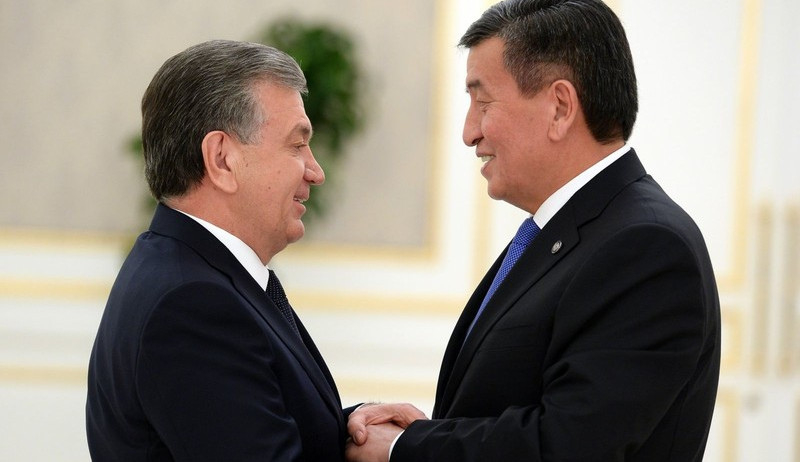
akipress.com 
akipress.com -
It is highly common in the west to say "Thank you" frequently, and it is seen as unfriendly when someone does not utilize polite expressions like "thank you," "you are welcome," etc. The scenario is a little different in Kyrgyzstan. Without a doubt, Kyrgyz people express gratitude and welcome others, but they probably do it less frequently than Westerners. It is one of the lists of Kyrgyzstan culture, customs, and etiquette. Therefore, at first, it would appear a little unexpected, and you would have to adjust to this cultural difference. Additionally, in Kyrgyzstan, you are only permitted to greet someone once each day because doing so will make them believe you have forgotten that you have already met them.
In order to address an unknown individual, distinct words are used in Kyrgyzstan. It would be really welcome if you could speak a few words of the native tongue or Russian. It is customary to address females as "gospozha" (madam), "zhenshina" (woman), elder Kyrgyz women as "Edje" (older sister), and young ladies as "devushka" (girl) or "Chon Kyz if addressing a Kyrgyz girl. Males are addressed as "gospodin" (sir), and young men are frequently referred to as "paren" (boy) or "molodoi chelovek" (young man). Speaking to an older male Kyrgyz, say "Baike" (older brother).
When you don't know someone well, you typically use either the gospozha So-and-So or the gospodin, which are both highly formal ways of addressing people. When addressing or calling someone, So-and-So uses their first name and patronymic ("otchestvo" in Russian). For instance, gospodin Niuhalov or Artem Dmitrievich for men and gospozha Ivanova or Elena Petrovna for women. With friends, you can just call them by their first names or, if they have any, by their nicknames.
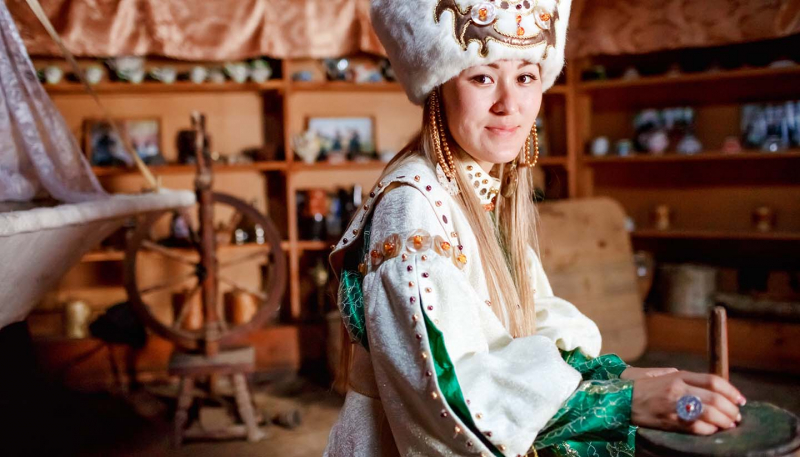
worldtravelguide.net 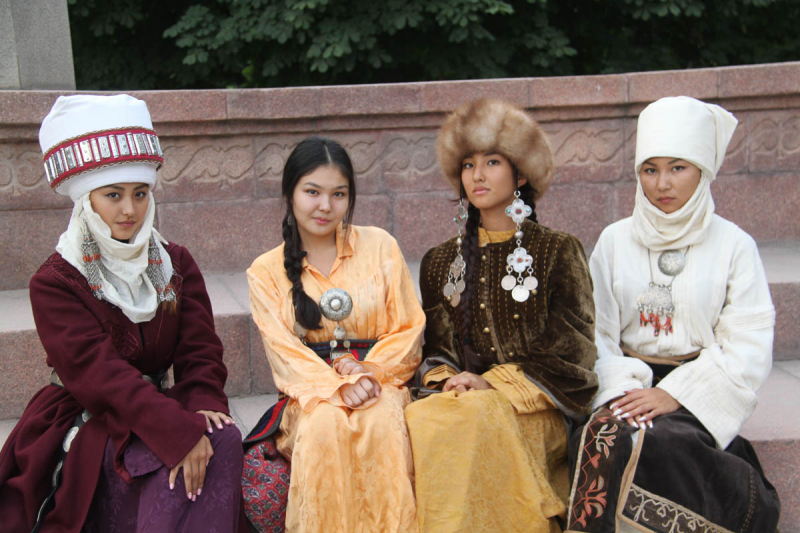
worldtravelguide.net -
On the street, strangers frequently pass each other without making eye contact. However, any close interaction, like sharing a seat on a bus or conducting business at the bazaar, will pave the way for introductions. It is customary to extend home invitations to strangers. Everyone is aware that Westerners frequently grin in person and in photographs. When speaking to a Kyrgyz, you won't see a wide grin very often, and they seldom ever smile in photographs. It is also a matter of culture. People are simply not used to smiling frequently (many claim there is no reason to), and if you are overly kind to others, they may find you a little odd. Of course, there are always exceptions, and you can run into someone who is extremely cordial, courteous, and nice.
Compared to the United States, there is less respect for personal space, and people frequently bump into one other in public without saying anything. People frequently sit shoulder to shoulder, and couples of the same sex frequently engage in physical contact. People don't typically form lines. It's common and acceptable to move forward in a line for service.
In Kyrgyzstan, the concept of personal space is simply nonexistent. This is particularly important while using public transportation because it can be very crowded and people may push, lean against, or even touch your elbows. This might come as a surprise to a Westerner who is accustomed to the 60-centimeter rule of distance. People here are used to chatting close to you, so you might want to move aside when conversing with them. However, if you do, they will likely want to approach you again. Please don't take that as an insult, as awkward and weird as it may sound to you. Family customs may hold the key, as Kyrgyz people typically live in close quarters with over 5–6 other people.
In Kyrgyzstan, where smoking is prevalent, there is no age restriction on smoking (like in European countries and the U.S.). Cigarettes can be bought anywhere—at stores, markets, kiosks, and "bazaars"—and no identification with a birth date must be presented. Because of this, it is quite simple for young children to purchase tobacco products, and the number of children who smoke is rising. Officially, smoking is not permitted in escalators, healthcare facilities, on public transit, or in taxis. Additionally, smoking is prohibited in most public spaces (such as museums, markets, classrooms, and offices). In most restaurants and cafes, smoking is permitted indoors, and there is typically no separation between the smoking and non-smoking areas. So, if you smoke, your happiness won't increase.
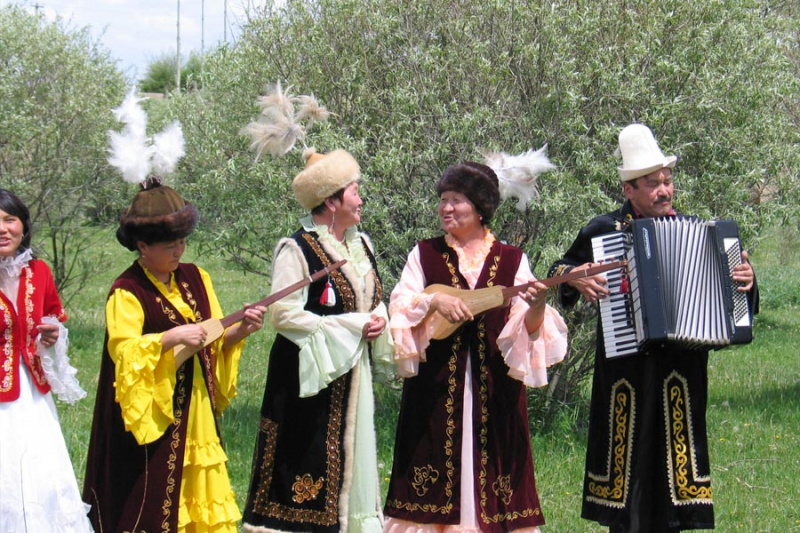
advantour.com 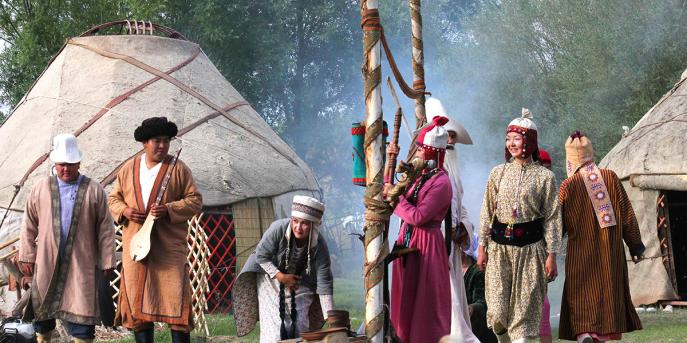
advantour.com -
In Kyrgyzstan, time can be very subjective, and is one of the lists of Kyrgyzstan culture, customs, and etiquette. You'll discover that arriving late for an occasion can be either polite or suitable, depending on the context. Here is a "rule of thumb" approach to help you decide when to be early, on time, or late. Situations and general guidelines:
- An appointment: Be on time (the person you are meeting might be late);
- Lunch with friends: Be on time/few minutes late
- Business lunch/dinner: Be on time;
- Dinner at friends: 10-30 minutes late.
The idea of time is foreign to Kyrgyzstanis, who also lack the discipline to keep time. They frequently arrive late for meetings, professional dinners, conferences, and a variety of other occasions. For someone who loves his or her time, it can be really annoying, but be ready for that. Another cultural difference that you would need to acknowledge, if not accept. You'll discover that you are accustomed to creating a daily schedule and making an effort to adhere to it. That is practically unattainable here. The automobile can break down, or someone might try to hold you up, offer you tea, and act angry if you decline. There is a narrow line to tread; one is to resist the urge to give in and say, "Listen, you were meant to be here at 2, now it is three, and I do not have time to meet you now," or to grow used to having a jumbled schedule every day. You need to locate the line that lies between them. You will only experience frustration and anger if you strive to uphold the standards that you are accustomed to. If you choose to drink tea and find that on every occasion you wind up accomplishing nothing, finding a happy medium is difficult.
Why do they constantly arrive late? The lack of punctuality and disregard for time shown by those close to you in Kyrgyzstan may be very upsetting to you. This would be particularly valid in the context of "guesting." Either the hosts will be prepared and the guests will be on time, or the hosts won't be prepared and the guests will be late. Keep in mind that time is not money in this region of the world; rather, it is viewed differently. Being a little more patient is the ideal response in cases like that.
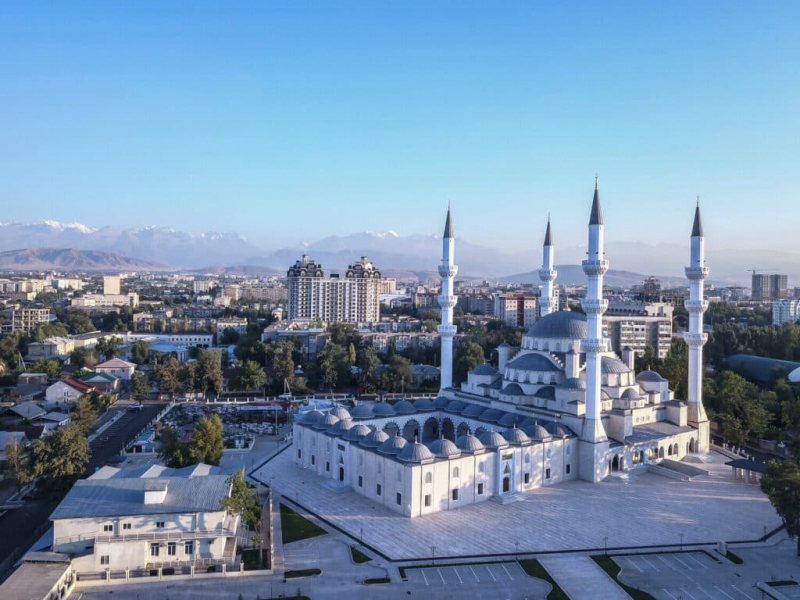
digitalnomads.world 
digitalnomads.world -
The Kyrgyz are really kind people. If a Kyrgyz family welcomes you over for dinner, you should bring a little present, like some fruit or flowers, and remove your shoes before entering. Most of the time, visitors are expected to remove their shoes in the hallway before entering the rooms when they enter someone's home. You would wear your socks because sometimes slippers are provided and other times they are not. At huge gatherings in the more traditional south, men and women frequently sit in separate rooms. It's rare for boys and girls to become friends.
When you initially offer anything to eat (such as chocolate or sweets) to a Kyrgyzstani individual, they frequently reject it, leading you to believe they do not want it. They would actually like to taste what you have to give, and many people around here believe it would be rude to decline right away. If you exert a little pressure, say: "When you demand," "Oh, please, take a piece of it and taste it," they will eventually give in and respond, "Oh, OK." I'll sample it. I'm grateful. "However, it's possible that they had been daydreaming about it all along. Therefore, if you find yourself in a scenario like this and are offering someone something, try to convince them to taste or accept your offer numerous times. People would probably feel embarrassed to ask for it themselves if you just gave them one chance, and if they decline, you don't offer again.
Russians and Kyrgyz people prefer to sit on stools, benches, or chairs rather than the floor. Fantasticasia.net reports that most senior citizens believe sitting on the ground or on the floor in place of a chair or bench is rude and bad for their health (due to the risk of becoming chilly). Of course, young people are considerably less concerned with such things, but generally speaking, sitting on the ground or the floor is not considered appropriate. Another reason for not sitting on the floor would be that the floors are usually not covered with carpets like they are in foreign countries, and are usually extremely unclean to sit on. You'll note that many young people (both men and women in villages) squat rather than sitting on the ground. The fact that some people can hold themselves in this position for a solid 30 minutes amazes foreigners the most.
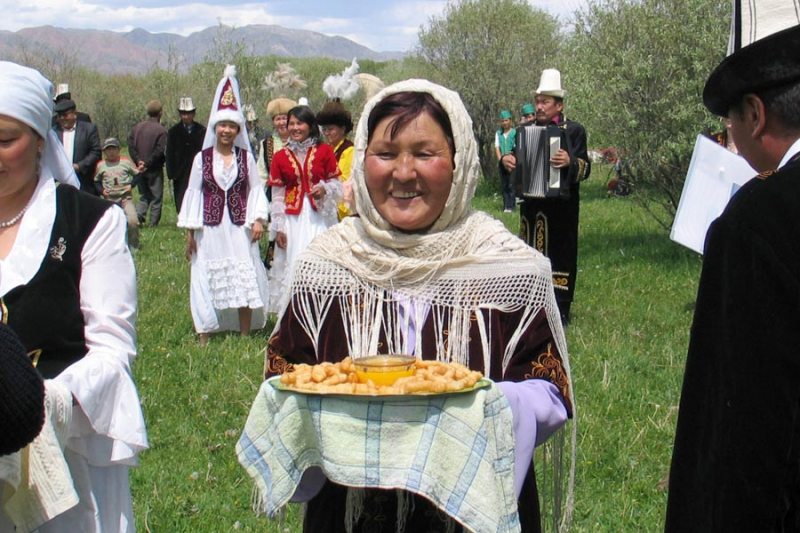
advantour.com 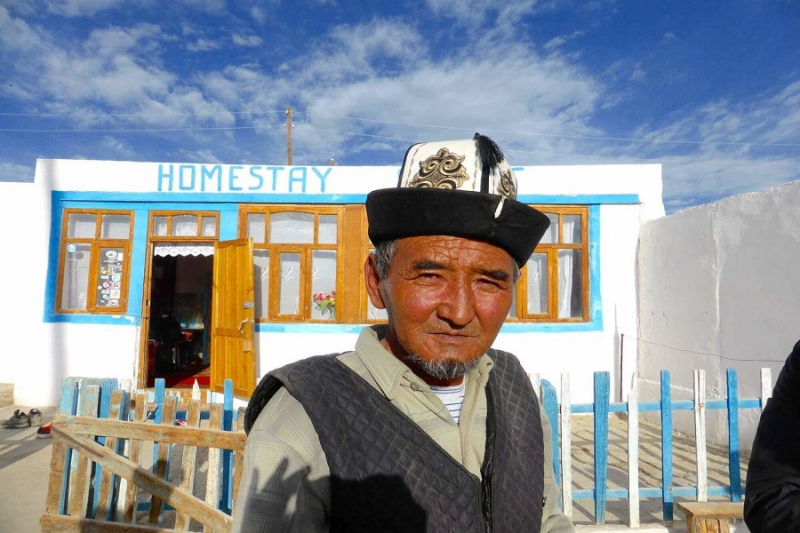
advantour.com -
It is typical to be asked to a local's home, especially in the countryside, as Kyrgyz people are quite hospitable. People from other countries are frequently invited to social events like weddings and birthday parties. If you accept an offer, make sure to bring a present. If you know your host drinks alcohol, local delicacies or a bottle of vodka are also excellent options. If it's a coworker you don't know well, you can just wish them well and maybe even send flowers, but that's normally reserved for women. If you give someone flowers, keep in mind one simple rule: the number of flowers you bring on certain occasions matters a lot. At funerals, an even number of flowers are delivered. Any other event that calls for an odd number of flowers. If it's your friend's 30th anniversary, you most definitely don't want to bring 12 carnations (or roses, or any other flower).
It is not important for visitors to arrive at a private party promptly; you are allowed to be a few minutes late. Take off your shoes when you come for supper and leave them at the door. Let your host show you to your seat and take the lead throughout any rituals that may be held for you as a guest. The first of them is frequently a toast with a glass of vodka (for the locals who do use alcohol); if asked to make a toast in return, remember to thank your host for their hospitality and good luck. Regularly, people are invited over without a specific purpose. There are specific sitting arrangements for attendees at a typical informal Kyrgyz celebration, so be aware of that if you are invited. Typically, the oldest person or special guest is invited to take a seat at the head of the table, or "tyor," as it is known in Kyrgyz (the seat most distant from the door). In order to serve as "waiters," young people or hostesses sit near the door. They carry and remove the dishes, make the tea, and perform other tasks. In general, you work more when you're younger. When visiting someone, bring some treats or mementos for the kids.
A restaurant or cafe can occasionally be used to celebrate a particular occasion. Identify the time to arrive and the amount of money to bring in advance. An invitation may indicate that the host is treating in some situations, while in others it may be an "everyone pays for himself/herself" scenario. In Kyrgyzstan, the concept of personal space is simply nonexistent. This might come as a surprise to a Westerner who is accustomed to the 60-centimeter rule of distance. People here are used to chatting close to you, so you might want to move aside when conversing with them. However, if you do, they will likely want to approach you again. Please don't take that as an insult, as awkward and weird as it may sound to you. Family customs may hold the key, as Kyrgyz people typically live in close quarters with five to six other people.
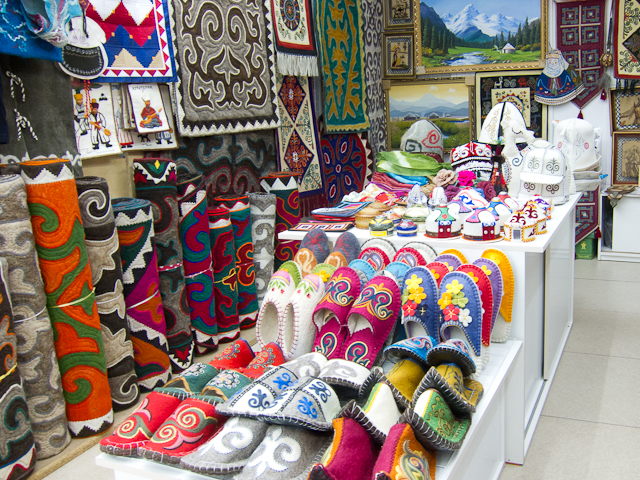
silkroadexplore.com 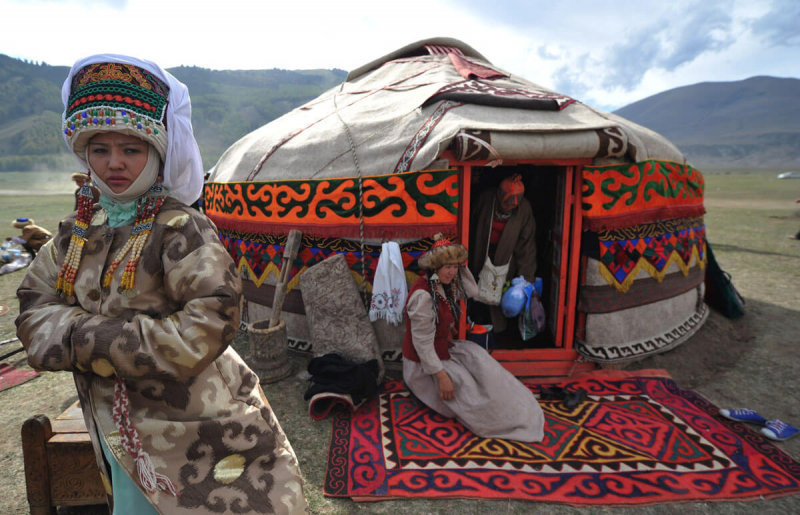
silkroadexplore.com -
Kyrgyzstan's eating customs include covering the table with a white cloth called a "dostorkon" (may be a table or the floor). A loud "omin" is used to express gratitude to God at the conclusion of a meal. A dostorkon is primarily used during picnics. On the dostorkon, people are expected to sit with their feet either at their sides or outward. Use your right hand alone to handle the food. That is one of the lists of Kyrgyzstan culture, customs, and etiquette. At the conclusion of the meal, raise your two hands to your face, dragging them down as if washing them, and say the Muslim "amen," "omin." Except in devout Muslim households, dining often entails drinking. When alcohol is offered, attendees are expected to consume it. Don't imagine you can limit your drinking since once you start, it can be challenging to say no to more.
The Kyrgyz people believe that bread is sacred and that it should never be left on the ground or turned upside down. Never wasted, the leftovers are fed to the animals. Wait until the host welcomes you to the table before beginning to devour the food. Allow the oldest or most esteemed guests to sample the dish first. Most of the time, hosts merely offer you something to drink without asking if you'd like it. A brief prayer might be offered after a meal. This praises the forefathers and is taken from the Qur'an. Everyone at the table covers their faces and says "omen" as the hands are held out with the palms facing up. Kyrgyzstan says it is a sin:
- To leave your food on the table untouched;
- To eat food while standing;
- To treat any food scornfully.
After you are seated, dining etiquette is fairly flexible, and a Kyrgyz person is unlikely to take offense to your improper eating habits. You might find that the host will serve everyone once the food is presented; there may be several courses, so try not to overindulge. Unfortunately, this entails that you must consume the food that is offered to you, which as a guest of honor can include a sheep head. You'll probably also be served kymyz, which is a mare's milk, especially if you visit in the summer months.
If you discover there are utensils (cutlery) available, use them any way you like, but ideally in the continental style (knife in the right hand, fork in the left). You will be expected to eat with your hand on other occasions, so only use your right hand when doing so. Your dinner will also include flatbread, which must be consumed in its whole and put straight on the table when not being consumed. Once more, use your right hand to eat your bread. Probably when the meal is over, you'll be given tea. Be sure to participate in this neighborhood classic and mingle to end the dinner.
For guests, there are certain sitting arrangements. Typically, the oldest person or special guest is invited to take a seat at the head of the table, or "tyor," as it is known in Kyrgyz (the seat most distant from the door). In order to serve as "waiters," young folks or hostesses sit near the door. They carry and remove the dishes, make the tea, and perform other tasks. In general, you work more when you're younger. When visiting someone, bring some treats or mementos for the kids.
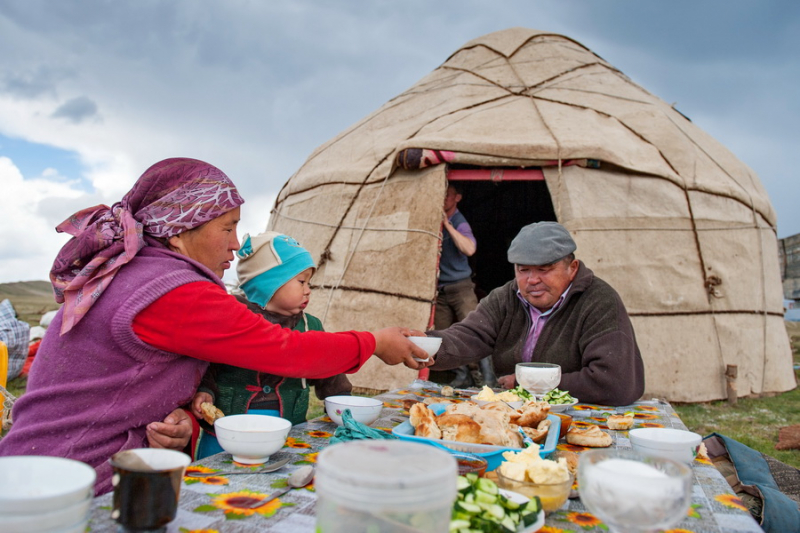
advantour.com 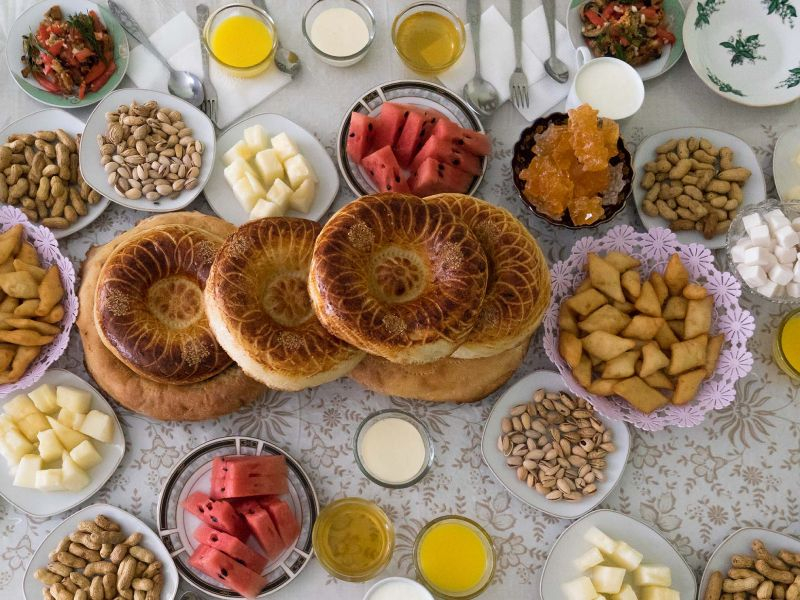
advantour.com -
A traditional beverage known as koumiss is offered during the summer. When in season, this fermented mare's milk beverage is served at celebrations. Vodka shots are a requirement during every celebration. Kyrgyzstanis have a tradition of drinking a lot of alcohol for holiday celebrations. Typically, the drinks include beer, wine, champagne, and vodka, though occasionally all of these are served.
In certain Kyrgyzstani homes, visitors could feel under pressure to consume more alcohol than usual. There will be a lot of toasting if you attend a major event, such as a birthday celebration or a national holiday, and most toasts are typically received with a "bottoms up" gesture. People will pour a lot of alcohol in your honor if you are a guest of honor (and as a foreigner, you may anticipate this), and regardless of how much or little you enjoy it, you are expected to down it all. Such extensive drinking may be challenging for someone who is not used to it, and the main objective for someone like that would not be to stay sober but rather to prevent getting sick. Therefore, the best course of action in this scenario is to respectfully decline the offer of alcohol if you truly don't feel like drinking. You might accept one drink believing that's all, but if you do, tradition will usually require you to continue drinking with the others until the bottle is empty. Women find it simpler to abstain from drinking than do males.
Much like drinking is an important component of any social function, toasting is an important component of each drinking event. It is expected that everyone can deliver a lengthy toast. The toast is great the longer it is. According to legend, long toast indicates wisdom. A toast is equivalent to giving a speech in front of a large audience. Many people take delight in receiving a toast, while others take offense at not being asked to make one. For this reason, the host or toastmaster would frequently wait until everyone had an opportunity to make a toast before concluding the gathering. Additionally, make sure you pour drinks for everyone before pouring for yourself. This would be quite strange.
lets-travel-more.com 
lets-travel-more.com





























